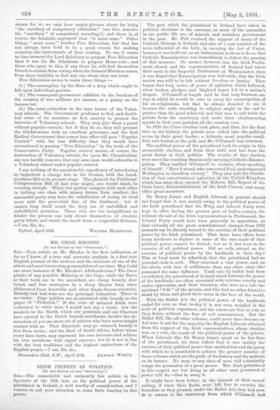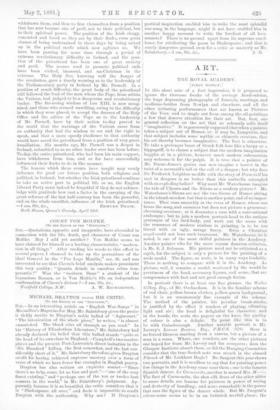IRISH PRIESTS IN POLITICS.
[TO THE EDITOR OF THE "SPECTATOR."]
SIR,—The remarkable and eminently fair article in the Spectator of the 18th inst. on the political power of the priesthood in Ireland, is well worthy of consideration, and I venture to call your attention to some facts bearing on this power.
The part which the priesthood in Ireland have taken in political elections is the outcome, as most of the anomalies in our public life are, of misrule and mistaken government in the past. Mr. Pitt received the support of many of the Catholic Bishops in Ireland, and also of a vast number of the more influential of the laity, in carrying the Act of Union, because it was held out, as an inducement to them to do so, that Catholic Emancipation was immediately to follow the passing of that measure. No sooner, however, was the Irish Parlia- ment closed, and the representatives of Ireland had taken their seats in the Imperial Parliament at Westminster, than it was found that Emancipation was laid aside, that the Irish nation was still to be left without freedom or justice. Then began that long series of years of agitation whieh followed,, when broken pledges and blighted hopes led to a nation's despair. O'Connell at length said he had long foreseen one way in which he would be sure to carry the emancipation of' his co-religionists, but that he always dreaded to use it because the evils resulting to religion might in the end be greater than the good achieved, and that was, to call forth the priests from the sanctuary and make them electioneering agents in their own parishes all the country over.
In 1826 the Clare election took place, and then, for the first. time in our history, the priests were called into the political arena by their great leader; a hitherto most popular candi- date was beaten at the poll, and Mr. O'Connell was returned.
The political power of the priesthood took its origin in this. memorable election, and from then until now has been the great factor in Irish politics. The results of this election were more far-reaching than in only carrying Catholic Emanci- pation. They enabled O'Connell to exclaim, when speaking of himself : "Here I stand, who converted Peel, and conquered Wellington in bloodless victory." They also laid the founda- tion of that constitutional agitation in the United. Kingdom which has since then carried the Reform Bill, Repeal of the Corn Laws, Disestablishment of the Irish Church, and many other great measures.
Sir Henry James and English Liberals in general should not forget that it was mainly owing to the political power of the Irish priesthood that the Whig and Liberal Party were kept in office during the greater part of half-a-century, for without the aid of the Irish representatives in Parliament, the Liberal Party would have been generally in opposition, so that virtually all the great constitutional changes from 188a onwards can be directly traced to the exercise of their political. power by the Irish priesthood. That there have often been, many incidents to deplore in some of the uses made of that political power, cannot be denied ; but so it has been in the exercise of all political power. Did no evils attend on the exercise of political power by the landlords in their day P This at least must be admitted, that the priesthood had no' personal ends to seek. They exercised a vast power, and, on the whole, with less of selfishness than any other class who possessed the same influence. Until vote by- ballot had been established, the priesthood of Ireland stood between the power of the landlords, too often exercised with extreme cruelty and undue oppression, and their tenantry, who were as a rule the spiritual "folk" of the priests, and who had no other friend ta stand by them and plead their cause in the face of the world.
With the Ballot Act the political power of the landlords ended for ever, so that to-day it is not even weighed in the scale of political organisers, and the voters are free to vote as. they desire, without the fear of evil consequences. But the Ballot Bill, like all other reforms, could never have become an Act were it not for the majority the English Liberals obtained. from the support of the Irish representatives, whose election was, as a rule, the result of the political power of the priests. When Liberals like Sir Henry James speak as he has done, of the priesthood, let them reflect that it was mainly the. exercise of their political power that enabled him and the party with which he is associated to achieve the greater number of' those reforms which are the pride of its history and the mottoes on its banner. No man, or any class of men, will voluntarily resign the possession of a great power. The Irish priesthood in this respect are but doing as all other men possessed of power will do,—that is, using it.
It might have been better', in the interest of their sacred, calling, if when their flocks were left free to exercise the franchise as they pleased, under the Ballot Act, they had seen_ fit to return to the sanctuary from which O'Connell had
withdrawn them, and thus to free themselves from a position that has now become one of peril, not to their political, but to their spiritual power. The position of the Irish clergy, venerated and loved as they are by their flocks, runs great chance of being undermined in these days by being mixed up in the political strife which now agitates us. We have been passing for some time through a period of extreme revolutionary difficulty in Ireland, and the posi- tion of the priesthood has been one of great anxiety and peril. The means used to promote political ends have been wicked, immoral, and un-Christian in the extreme. The Holy See, knowing well the danger of the revolution, gave a timely warning as to the leadership of the Parliamentary party in Ireland by Mr. Parnell. In a position of much difficulty, the great body of the priesthood still followed the lead of the man whom the Pope, from within the Vatican, had judged to be a dangerous and revolutionary leader. The far-seeing wisdom of Leo XIII. is now recog- nised, and those who seemed unwilling, owing to the difficulty in which they were placed, to accept the decrees of the Holy Office and the advice of the Pope as to the leadership of Mr. Parnell, have by their action to-day proved to the world that the warnings of the Vatican came from an authority that had the wisdom to see and the right to speak, and that a more speedy obedience to that authority would have saved the priesthood from a position of very grave humiliation. Six months ago, Mr. Parnell was a despot in -Ireland, submitted to as no other leader ever has been before. To-day, the entire priesthood, who had been his main support, have withdrawn from him, and so far have successfully influenced their flocks to do in like manner.
The lessons which these events have taught may vastly influence for good our future position, both religious and political, in Ireland; but whether the Irish priesthood continue to take an active part in political life or no, the English Liberal Party must indeed be forgetful if they do not acknow- ledge with gratitude how vast a factor in the carrying of the great reforms of the last half-century has been the powerful, and on the whole unselfish, influence of the Irish priesthood.







































 Previous page
Previous page